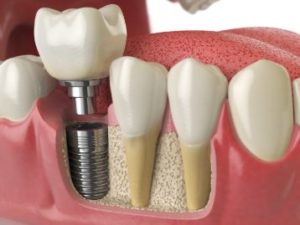4 Reasons To Replace Missing Teeth and How Dental Implants Can Help
October 5, 2019
 Missing a tooth doesn’t impact your oral health very much, right? Think again! Most people are surprised to learn about the many unanticipated consequences of losing even one tooth. And since tooth loss is so common, there’s a good chance that you or someone you know will experience it at some point. Fortunately, we live in a day and age where there are excellent replacement options like dental implants that look and feel incredibly natural. Keep reading to learn about the 4 problems you can develop if you fail to replace your missing teeth.
Missing a tooth doesn’t impact your oral health very much, right? Think again! Most people are surprised to learn about the many unanticipated consequences of losing even one tooth. And since tooth loss is so common, there’s a good chance that you or someone you know will experience it at some point. Fortunately, we live in a day and age where there are excellent replacement options like dental implants that look and feel incredibly natural. Keep reading to learn about the 4 problems you can develop if you fail to replace your missing teeth.
1. Your Jawbone Will Begin To “Shrink”
As soon as a tooth is gone, the jawbone that once surrounded the root begins to deteriorate. Over time, the bone becomes thinner and weaker, eventually changing the shape and structure of your face and leading to a more aged appearance. In addition, it increases the likelihood of needing procedures to strengthen the jawbone (e.g. a bone graft) if you should ever want to get dental implants in the future.
2. Speaking and Chewing Can Become More Difficult
Each and every tooth functions together to help you eat a wide variety of foods. Steak, corn on the cob, carrots, chewy bread, and more can all become more difficult to eat after tooth loss. In addition, enunciating words clearly can also be more challenging.
3. You’ll Have Less Self-Confidence
While you would expect a missing front tooth to be obvious to others, even a missing back tooth is usually visible to other people when you laugh. This can really do a number on your self-confidence, which makes it harder to navigate everyday situations like presentations at work, first dates, and weddings.
4. Your Other Teeth Will Begin To Move
In addition to the direct impact of having fewer teeth, your remaining teeth are indirectly affected because they can begin to move and shift. This occurs because your teeth are naturally always moving forward (which explains why the front teeth often become more crowded with age). But missing a tooth greatly accelerates the process because there’s nothing stopping the teeth that were behind it from “tipping forward.” This can lead to changes in your bite, TMJ problems, uneven wear, and even more tooth loss.
How Do Dental Implants Help?
In the dental field, dental implants are widely considered the “gold standard” in tooth replacement. They stand out from other options like bridges and dentures because they replace both the roots and crowns of missing teeth, which enables them to function the way natural teeth do.
This key benefit enables implants to prevent all of the issues listed above. They help your jawbone remain healthy and strong, give you fantastic chewing strength, maintain the health of your remaining teeth, and also give you a smile that looks great. Not to mention that they can last 30 years or more with basic care and maintenance.
Simply put, implants are one of the best investments you can make in your oral health. Whether you’ve lost one tooth or all of your teeth, implants can be customized to give you the complete smile you need for a great quality of life.
About the Author
Dr. Bob Koenitzer is a native of Petaluma and a graduate of the University of California at San Francisco, where he later became a faculty member. With a nearly lifelong passion for the field of dentistry, he can provide a wide variety of solutions for people dealing with tooth loss, including dental implants. If you have any questions about missing teeth or dental implants, you can reach Dr. Koenitzer via his website.
No Comments
No comments yet.
RSS feed for comments on this post.
Sorry, the comment form is closed at this time.